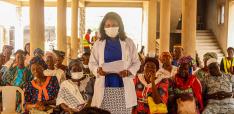Book Review: The War on Women: And the Brave Ones Who Fight Back

The War on Women: And the Brave Ones Who Fight Back by Sue Lloyd-Roberts. London: Simon & Schuster UK 2016. 320 pp, £16.99 hardcover 9781471153907, £8.99 paperback 9781471153921, £9.99 e-book 9781471153938
The fact that the female half of the world’s population is discriminated against and disadvantaged in so many aspects of life is hardly news. One could ask whether there is a need for yet another book highlighting this problem. In light of The War on Women: And the Brave Ones Who Fight Back by Sue Lloyd-Roberts, the answer to that question must be a resounding yes.
Sue Lloyd-Roberts was a multi-award-winning BBC journalist who died of cancer in 2015 before completing this book. Her daughter Sarah Morris finalised it. After starting her career as a news trainee at ITN in 1973 she went on to become the UK's first female video-journalist to be posted alone to places such as the former Soviet Union and Iran. Her peers praise her as an “honest reporter, who went where others didn’t dare”. But she also became known as the BBC’s “Hopeless Cause Correspondent”, as over her 30-year-long career she witnessed and reported some of the worst atrocities inflicted on women across the globe.
In twelve chapters, Lloyd-Roberts brings to life the many stories of women who suffered, witnessed and combated oppression, discrimination and violence. The focus of her first chapter is on female genital mutilation (FGM), and follows the story of Maimouna, who despite being a daughter of a village circumciser in the Gambia rejects her ancestral obligation to become the next village ‘cutter’. Lloyd-Roberts goes into horrifying details of the brutality of the FGM practices, and underlines the agony that girls undergoing the procedure must endure. At the same time the author also describes the suffering of those who are expected to perform the act of mutilating girls, including their own daughters. Chapter five, “What Made Her Go There?” sheds light on the situation of women in contemporary Egypt and the fate of female protesters during the Arab Spring in particular. Lloyd-Roberts describes how at the beginning of those protests “women were standing alongside men shouting the slogans of the revolution”. What became known in Egypt as ‘The Age of Chivalry’ had come and with it the absence of harassment; but it regrettably was not to last. The desperate stories of women, notably including the American CBS Reporter Lara Logan, who were violently attacked and raped, and who never received justice for the crimes committed against them, provide insight into some of the darker aspects surrounding the 2011 popular uprisings. The targeted arrest of women and subsequent virginity tests combined with other abuse was also a regime strategy to discourage protest. The lack of accountability for such crimes is in part explained by widely held views – including in the judiciary and the military – that “well-behaving women would not leave their home to protest”, making women’s participation in protests a sign of loose morals and imprudence.
Chapter five, “What Made Her Go There?” sheds light on the situation of women in contemporary Egypt and the fate of female protesters during the Arab Spring in particular. Lloyd-Roberts describes how at the beginning of those protests “women were standing alongside men shouting the slogans of the revolution”. What became known in Egypt as ‘The Age of Chivalry’ had come and with it the absence of harassment; but it regrettably was not to last. The desperate stories of women, notably including the American CBS Reporter Lara Logan, who were violently attacked and raped, and who never received justice for the crimes committed against them, provide insight into some of the darker aspects surrounding the 2011 popular uprisings. The targeted arrest of women and subsequent virginity tests combined with other abuse was also a regime strategy to discourage protest. The lack of accountability for such crimes is in part explained by widely held views – including in the judiciary and the military – that “well-behaving women would not leave their home to protest”, making women’s participation in protests a sign of loose morals and imprudence.
While providing the reader with insights into the challenging everyday realities of women in different parts of the world, Lloyd-Roberts emphasises that their stories are neither isolated incidents nor justifiable by “tradition”. Rather, they are part of a worldwide war on women and the value of equality. The idea of a “war” on women may at first sound exceedingly forceful, but each and every one of the accounts of women presented in the book depict elements of the systemic violence and mistreatment that women experience on a daily basis all across the world. Understood in this context, FGM or virginity checks are not just isolated examples of the oppression of women’s bodies, but reflect a deeply entrenched belief that the female body and sexuality have to be controlled. Damaged bodily dignity and integrity of women is a powerful tool to convey the message that a woman is inferior and her sexual appetites need to be curbed and controlled by e.g. circumcision, lest they become a threat. Further to the global scale of the author’s enterprise, stories from the Global North are included too. Among these, the author brings to attention the equal pay battles (Chapter Twelve) in places like the UK, where the job of a female care worker work is rated less “mentally demanding” than that of a bin man: illustrating the argument that women are akin to a “persecuted ethnic minority” because of their gender.
What makes The War on Women emotional, confrontational and brutally honest is the matter-of-a-fact style of writing that Lloyd-Roberts employs. She creates such a powerful commentary that despite an impression that the book feels at times a little rushed, it is a real page-turner. Moreover, by providing proof of compassionate humanity even in what seems to be the bleakest of circumstances, the author left this reviewer with the feeling of being inspired to act. This is what makes the book an excellent source of motivation for anybody interested in equality, women’s rights or merely a good piece of reportage writing.
The War on Women is more than just a collection of stories; it comes close to a manifesto against female subjugation. And while the question posed by the author in the introduction – “Why is it … that women who make up 51 per cent of the world’s population are still campaigning for fair and humane treatment in the twenty-first century …?” – remains unanswered, the book makes a powerful and gripping case for gender equality and the fight against injustice. It is unquestionably one to provoke reflection if not action within civil society and policy circles.
Patrycja Długosz-Stroetges is a PhD Candidate in Human Geography at Durham University. Her current research focuses on the sharing economy’s impact on cities. Her other research interests include political sociology and gender studies. She holds an MSc in Environmental Management and Policy from Lund University and an MA (Hons) in Politics and International Relations from the University of Aberdeen.


